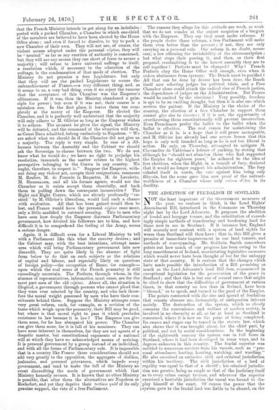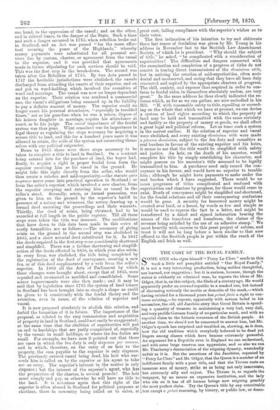THE ABOLITION OF FEUDALISM IN SCOTLAND.
NOT the least important of the Government measures of the year, we venture to think, is the Land Rights' Amendment Bill, introduced in the Commons on Thursday night last by the Lord Advocate. It proposes the abolition of feudal and burgage tenure, and the substitution of exceed- ingly simple methods of transferring and burdening land for those now in use in Scotland. If it becomes law, England will scarcely rest content with a system of land rights far worse than Scotland will then have : that is, this Bill gives a promise of immediate improvement in our land tenures, and methods of conveyancing. Mr. Goldwin Smith somewhere points out how much of our progress has been owing to the long unsettlement of Ireland, necessitating legislative measures which would never have been thought of but for the unhappy state of that country. It is curious that the changes which hai-e made possible the introduction of a Bill promising so much as the Lord Advocate's land Bill does, commenced in exceptional legislation for the preservation of the peace in Scotland ; and that this is but one of several cases that might be cited to show that the difficulties of government at various times, in that country no less than in Ireland, have been " blessed," so to speak, and turned to the good of the Empire.
The points connected with the rise and spread of feudalism that remain obscure are, fortunately, of antiquarian interest mainly. The destruction of the system, which so closely concerns the convenience and welfare of modern society, is involved in no obscurity at all, so far at least as Scotland is concerned, where it is now on the point of being completed. Its causes and stages can be traced in the statute law, which also shows that it was brought about, for the chief part, by political, and not by social considerations. In the beginning of the eighteenth century the system was in full force in Scotland, where it had been developed in some ways, and to degrees unknown in this country. The feudal superior was entitled to numerous services from his vassals, such as " per- sonal attendance, hosting, hunting, watching, and warding." He also exercised an extensive civil and criminal jurisdiction within his territory. The civil jurisdiction of a lord of regality was equal to that of a sheriff ; his criminal jurisdic- tion was greater, being as ample as that of the justiciary itself as to every crime except treason, and wherever the superior exercised a heritable jurisdiction the vassal was bound to dis- play himself at the court. Of course the power that the system gave to the feudal lord was liable to be abused, on the
one hand, to the oppression of the vassal ; and on the other, and in critical times, to the danger of the State. Such a time and such a danger occurred in 1715, when rebellion broke out in Scotland, and an Act was passed " for the more effec- tual securing the peace of the Highlands," whereby money payments were substituted for all personal ser- vices due by custom, charter, or agreement from the vassal to the superior, and it was provided that agreements made in future stipulating for such services should be void. /This was the first step in the break-down. The second was taken after the Rebellion of 1745. By two Acts passed in 1747 the heritable jurisdictions were abolished, the vassals discharged from attending the courts of their superior, and an end put to ward-holding, which involved the casualties of ward and marriage. The vassal was now no longer dependent on the superior. Their relation was rendered a commercial one, the vassal's obligations being summed up in the liability to pay a definite amount of money. The superior could no longer exact his personal attendance, " especially in troubled times," act as his guardian when he was a minor, dispose of his heiress daughter in marriage, require his attendance at court, or be his judge. The social importance of the feudal system was thus gone. What remained was its importance in legal theory as regulating the steps necessary for acquiring a secure title to land, and this for a hundred years more it was allowed to retain, the evils of the system not connecting them- selves with any political exigencies.
Down to 1845 there were three steps necessary to be taken to complete a title to land in Scotland. On a contract being entered into for the purchase of land, the buyer had, firstly, to acquire a right in proper feudal form from the superior receiving him as his vassal in the ground. He might take this right directly from the seller, who would thus create a sub-feu and mid-superiority,—the statute quid emptores never came into practical operation in Scotland ; or from the seller's superior, which involved a new charter, from the superior accepting and entering him as vassal in the seller's stead. Secondly, seisin, or formal possession, was given to him on the ground by the superior's bailiff in presence of a notary and witnesses, the notary drawing up a formal deed narrating the proceedings and their warrants. Thirdly, the deed of seisin, being obtained, bad to be recorded at full length in the public register. Till all these steps were taken the title was insecure. The modifications that have down to this date been made in this series of .costly formalities are as follows :—The ceremony of giving .seisin on the ground in the second step was abolished in 1845, and a short notarial deed substituted for it. In 1847 the deeds required in the first step were considerably shortened and simplified. There was a farther shortening and simplifi- cation of the deeds effected in 1858, in which year also seisin, in every form, was abolished, the title being completed by the registration of the deed of conveyance, creating a new feu, or of this deed supplemented by a writ from the seller's superior. In 1868 all the Acts of Parliament by which these changes were brought about, except that of 1845, were repealed and re-enacted as modified and consolidated. Some minor improvements were also then made ; and it may be said that by legislation since 1745 the system of land tenure in Scotland has been brought into as simple a shape as could be given to it consistently with the feudal theory and the retention, even in name, of the relation of superior and vassal.
It is now proposed absolutely to abolish this relation, and forbid the formation of it in future. The importance of the proposal, as related to the easy transmission and acquisition of property in land in Scotland, could not easily be exaggerated; at the same time that the abolition of superiorities will put an end to hardships that are justly complained of, especially by the vassals in small holdings, or where the feu duties are small. For example, we have seen it pointed out that there are cases in which the feu duty is only sixpence per annum, and in which, therefore, on the entry of an heir to the property, the sum payable to the superior is only sixpence. The previously entered vassal being dead, his heir who suc- ceeds him is called on by the superior or his agent to take out an entry, The superior's interest in the matter is only =pence ; but the interest of the superior's agent, who has the preparation of the charter, is several pounds! The heir must comply and pay, as otherwise he will have no title to the land. It is notorious again that this right of the superior is often abused in Scotland for political purposes at elections, those in non-entry being called on to enter, at great cost, failing compliance with the superior's wishes as to their votes.
The first intimation of his intention to try and obliterate these last traces of feudalism was given by Mr. Young in his address in November last to the Scottish Law Amendment Society, of which he is president. " Why should the subject of title," he asked, " be complicated with a consideration of superiorities ? The difficulties and dangers connected with the examination and completion of a progress of titles do not consist in tracing direct transmissions of the dominium
but in noticing the creation of mid-superiorities, often acci- dental and unobserved, and seeing that they have all been duly evacuated and sopited by the appropriate charters of progress. The skill, anxiety, and expense thus required in order to con- form to feudal rules, in themselves absolutely useless, are very great." In the same address he thus clearly indicated the re- forms which, so far as we can gather, are now embodied in his Bill. " If, with reasonable safety to title, equalling or exceed- ing on the whole that which we have at present, we can devise a system of land rights according to which the property of land may be held and transmitted with the same certainty and facility as the property of money or goods, we shall effect a great legal and political reform. Let us trace such a system in the merest outline. If the relation of superior and vassal were abolished, and every existing dominium utile were made a plenum dominium, subject to the feu duty and casualties as real burdens in favour of the existing superior and his heirs, it seems to me that the title would be simplified with safety and justice. An heir, on the death of his ancestor, would complete his title by simply establishing his character, and might possess on his ancestor's title assumed to be legally transmitted to him. A purchaser need only record the con- veyance in his favour, and would have no superior to trouble him ; although he might have payments to make under the real burden which I have suggested. There would be no more progresses of titles complicated and confused with superiorities and charters by progress, for these would cease to exist. Deeds of conveyance might be simplified and shortened, for the feudal relations and all their conveyancing confusions would be gone. A security for borrowed money might be created over land, or a house, by words as few and simple as would be used to express the fact in a letter, and might be transferred by a dated and signed indorsation bearing the names of the transferor and transferee, the claims of the revenue being satisfied by the use of an adhesive stamp." We most heartily wish success to this great project of reform, and trust it will not be long before a boon similar to that now offered to the Scottish people is put within the reach of the English and Irish as well.



































 Previous page
Previous page